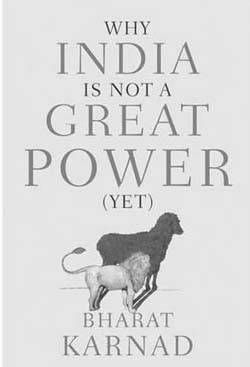India’, according to Bharat Karnad, ‘is a latter day Hanuman, potentially powerful, but dwarfed by doubts, unsure of its strengths, [and] weighed down by a sense of its own weakness.’ The Monkey God in the Ramayana was able to at least shakeoff his misgivings and triumph when it mattered. For Karnad, there is little evidence that India can do the same. It is a nation, as his scathing critique suggests, which ‘has been down for so long in history’ that bursts of recognition from the outside are treated unevenly as a mark of achievement. In effect, constant under-performance has been institutionalized, robbing India and Indians of a zeal for great power. This is the moot point in Karnad’s tour de force: Why India Is Not A Great Power (Yet). It is, in many aspects, a unique contribution to the limited body of work on Indian strategy, diplomatic history and military effectiveness. Paradoxically, the author’s more obvious and dim view—to put it politely—of Indian government and military elites masks the potential in a nation that desperately needs, in his view, to appreciate ‘hard power’.
This is a book that will not please diplomats and bureaucrats alike, no matter in which government they served in the past many decades. It is also a book that is hard to typify. It’s not a work on theory. It does not pretend to mimic the historian’s art of telling and retelling stories of the past. This is a book that combines multiple disciplines from history to military sciences to economics. It is lucidly written and based on a more-than-impressive set of secondary sources and first hand interviews with those who made and unmade policy in India’s recent past. In short, this is a book that ought to be and needs to be read by anyone interested in a simple but often neglected question: What is it that makes India tick? For Karnad of course, India does not tick. It merely responds to changes in power structures to ‘work aimlessly to produce policies on-the-run’.
The question of how and why nation-states take particular decisions is of course a matter of debate in the broader works on International Relations and Politics. Countries, scholars broadly argue, make crucial decisions because of the thirst for material power (economic might and military heft), because of the memory of the past that plays a role in determining their advance (think of revisionist states like Germany and Japan where the norm of anti-militarism post 1945 remains strong till date), and because of the role of mavericks or ‘founding fathers’ in the formation of the state. For Karnad, ‘great power’ is about harnessing the country’s resources with a view to actively shape world politics according to the convenience and wish of the Indian state. It’s about carving out a space distinctly for India, no matter how popular or unpopular those decisions might be within the comity of nations. China, according to Karnad, has done just this. Interestingly, and as one of the best chapters in the book makes clear (Chapter 1 on ‘India, a Great Power’), Jawaharlal Nehru had a vision for India.

